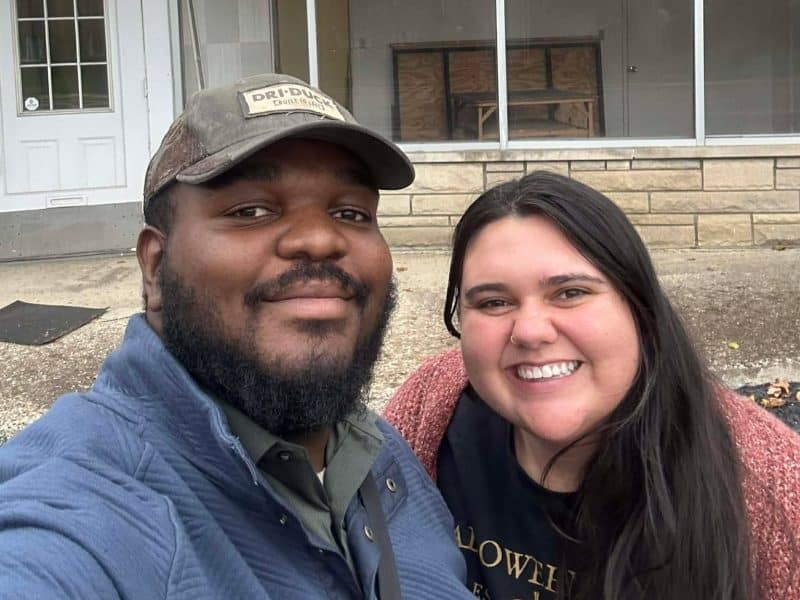‘Sound of Freedom’ lifts local trafficking orgs but at what cost?
Some Ohio nonprofits have seen a spike in donations and interest in the wake of the surprise hit anti-trafficking thriller, but the outpouring comes with an asterisk.

Suzanne Lewis-Johnson, a former FBI agent and the CEO of Ohio-based anti-trafficking nonprofit No More Trafficking, had an opportunity to view Sound of Freedom before it opened in theaters and left the screening feeling conflicted. Lewis-Johnson said she was grateful for the attention she believed the movie could draw to the issue of child trafficking but remained wary of many of the false perceptions she saw perpetuated onscreen.
“I think many [anti-trafficking] nonprofits are in a tough spot right now, because you have a movie that is putting out a message that could be concerning to those doing the work,” Lewis-Johnson said of the anti-child-trafficking thriller, which released on July 4 and has already grossed more than $127 million. “Yet part of the message surrounding the movie is ‘contribute to your local nonprofit.’ So, yeah, it’s messy.”
Prior to joining No More Trafficking in 2021, Lewis-Johnson served as an agent with the FBI, helping found Stark County’s Juvenile Human Trafficking Task Force and the annual Frontline to Freedom Conference. She said much of this early work in the realm focused on prevention, which proved far removed from the Hollywood-driven perception of trafficking, with its high-stakes, daring, action-driven rescues.
“And that misinformation was driving the purse strings. So, even if it was well-intentioned, it was doing harm, because people didn’t really understand the complexity of trafficking and weren’t addressing the root issues,” Lewis-Johnson said. “Ideally, you want to prevent trafficking from happening the first time, and that means you need a community that is mobilized and prepared to provide services to those who are vulnerable.”
“We’re so focused on kidnappers and those kinds of Hollywood stories, but most of the time the child is trafficked by someone they know,” said Hannah Swift, a supervising case manager and director of community outreach and training for Columbus-based anti-trafficking organization Gracehaven. “I can’t tell you how many times I tell someone what I do, and they’ll go, ‘Oh, like Taken!’ And I’m like, ‘No, not like ‘Taken.’”
Sound of Freedom, Lewis-Johnson said, reestablishes many of these early stereotypes of the work surrounding human trafficking, centering its “based on a true story” narrative on claims made by Tim Ballard, founder and former CEO of anti-trafficking nonprofit Operation Underground Railroad. In the film, actor and conspiracy theorist Jim Caviezel – recently part of the Christian nationalist “Truth and Freedom” rally staged at Faith Life Church in New Albany – plays a fictionalized version of Ballard as a rogue crusader who locates children sold into the sex trade and then rescues them, often in dramatic fashion.
Formed in 2013, Operation Underground Railroad gained notoriety with its claims of cinematic, high-stakes rescue operations – details of which were often difficult to verify. A 2020 Vice report attempted to parse the group’s claims, with journalists Anna Merlan and Tim Marchmam uncovering what they termed “a pattern of image-burnishing and mythology-building, a series of exaggerations that are, in the aggregate, quite misleading.” (Ballard resigned from the organization earlier this month following an internal investigation spurred by employee claims against the founder.)
While Swift agreed the trafficking depicted in the film was not representative of the cases Gracehaven typically sees in Ohio, she still came away moved by the film. “I’m very wary about movies about trafficking, in general, because they can be very sensationalized,” Swift said. “I’m waiting for someone to make the movie about the 16-year-old runaway who’s using drugs to numb the pain of her childhood sexual abuse. But that’s not glamourous, and that’s not the story Hollywood wants us to see or hear. What the movie did for me, though, is it reminded me of the time 11, 12 years ago, when I didn’t know what trafficking was, and it was stories like these that got me into the field to begin with.”
In the weeks following the film’s release, a similar enthusiasm has moved members of the moviegoing public to become more involved, Swift said, evidenced in a noticeable increase in donations and outreach made to Gracehaven. “We’ve had existing donors reach out and say, ‘I want to do more.’ And we’ve also had people come up and say, ‘What does it look like for me to donate or volunteer?’” Swift said. “And on the case management side of our work, I’ve had at least one parent come to me and say, ‘What is it about my daughter that puts her at risk for trafficking? And Sound of Freedom – is that stuff real?’ So, the movie has definitely stirred up questions. And it has definitely stirred up interest in the work that we’re doing.”
Lewis-Johnson said she has experienced a similar spike in public interest with No More Trafficking but cautioned that individuals looking to invest time or money into anti-trafficking should take the time to research and fully vet any organization before making a commitment. “There are groups out there that have tactical skills – whether they come from law enforcement or the military – but maybe they don’t understand the complexity of trafficking. Maybe they don’t understand the trauma. … And if you just go knocking down doors to get someone out of there, maybe they’re going to find themselves back in that situation again, and maybe you’ve even made it worse,” Lewis-Johnson said. “It seems counterintuitive, but if you want to support work to combat trafficking, maybe you donate to a group that doesn’t even have ‘trafficking’ in its name – groups that are doing mentoring, or housing work. … I started my career with Habitat for Humanity, which addresses poverty, which addresses housing. And what we did not recognize at the time was we were also addressing trafficking.”
In Columbus, these could organizations that provide for vulnerable youths – nonprofits such as Star House, Kaleidoscope Youth Center and Huckleberry House – and offer a vital safety net for those most at risk from traffickers.
“A number of the kids who come here have a history of trafficking, and usually it’s a result of not having anywhere to turn, and it’s usually resource-based and survival sex,” said Star House clinical therapist Katie Weaver, who added that many times the person involved doesn’t even know they’ve been trafficked. “In impoverished families, sometimes it’s the dad who’s trafficking, or it’s an uncle, or it’s a boyfriend. Often our young people, and especially our young women, don’t even realize they’re being trafficked. … And so, part of our work is saying, ‘This isn’t survival. This isn’t a normal way to get by. You’re being exploited.’”
One of the more challenging hurdles for anti-trafficking advocates could be that Sound of Freedom‘s popularity is being driven almost exclusively by the political right (the movie has been championed on social media by the likes of former President Donald Trump, conservative commentator Benny Johnson and Texas Sen. Ted Cruz) – a group that has traditionally been resistant to funding the types of social programs that could most directly impact trafficking, such as youth shelters or investing in the foster care system. In addition, the Republican Party has increasingly advocated for anti-trans and anti-LGBTQ legislation that could further exacerbate the problem.
“We’ll often see people come out as LGBTQ and not be accepted by their family, and then they’ll end up on the street as a result,” said Jill Gorz, clinical services manager at Star House, which serves north of 100 youths in a typical day, in addition to 59 residents currently being housed on the West Side at Carol Stewart Village, a long-term, affordable housing complex for youths experiencing homelessness.
The movie’s advocates have also been intensely sensitive to any criticisms levied against it, which Lewis-Johnson acknowledged has added to the challenge of having needed difficult conversations about issues related to the film. Rolling Stone culture writer Miles Klee experienced this reality firsthand, subjected to a flood of emails and social media posts slandering him as a pedophile (and worse) after publishing a review in which he described Sound of Freedom as “a stomach-turning experience, fetishizing the torture of its child victims and lingering over lush preludes to their sexual abuse.”
“The film, as propaganda, is designed that way, as to be sort of bulletproof. You can’t really take issue with it artistically or creatively without being seen as trying to suppress the message,” Klee said. “And, yeah, it might be a silver lining if [local anti-trafficking organizations] are getting money from these people. But I don’t like the fearmongering that comes with it. And I think we are scaring a lot of vulnerable, older people and parents into thinking that children are getting snatched off the street corner every day. And if you’re motivated by that to give to these groups, maybe that’s not the best kind of philanthropy we should hope for. It’s pretty low down and dirty, and I think it contributes to a more paranoid society, and that’s a big problem we have now.”
Along similar lines, Sound of Freedom has been adopted as a recruiting tool by adherents of the QAnon conspiracy, which includes the movie’s star, Caviezel, who in promoting the film has continued to spread the ideology’s most fantastical falsehoods, among them that traffickers are harvesting children’s organs and extracting the adrenochrome from their brains before murdering them. While the film itself avoids QAnon – in his review, Klee describes it as “relatively grounded in our universe” – the issues championed by the film have made it a valuable introduction into the conspiracy for its believers, much in the way the “Save the Children” campaign operated a few years back, providing sanitized public cover for a variety of ugly conspiracies.
“There’s no adrenochrome harvesting or anything like that in the film, and people really hammered me with that point in coming after me,” Klee said. “But it was interesting that people were denying any connection to the QAnon world while I was getting deluged with messages saying I was satanic, that I drank blood, that I’m in on organ-harvesting – all of these things that are much more extreme, QAnon-coded ideas. … I don’t know how you can deny the connection between the Q movement and this film. Even people on QAnon message boards were like, ‘We have to get more people to see this movie. This will wake them up to the truth.’”
Lewis-Johnson said she was “gravely concerned” with the way the film has been embraced to advance the QAnon conspiracy, and reiterated the importance of sticking to the truth when it comes to confronting the very-real issue of human trafficking.
“I’m happy we’re talking about the issue of trafficking, but now let’s talk about what it really looks like,” she said. “Frankly, as a person of faith, it is so concerning to me how sometimes in my faith community we just latch on to something because it aligns with who we are and what we believe. And then we just accept all of it. … We need to look at the facts, because we’re going to make the problem worse if we don’t make decisions based on good information and if we don’t bring everyone to the table who needs to be part of the conversation.”




